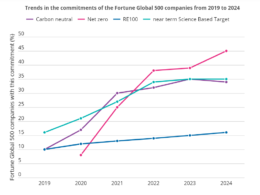The UN-convened Net-Zero Asset Owner Alliance (NZAOA), an industry-led coalition of 88 members with $9.5 trillion in assets under management (AUM), has released its fourth Progress Report, highlighting significant steps toward climate action and urging governments to accelerate their net-zero policies. As of the latest report, 81 members representing 98.9% of the Alliance’s AUM have committed to intermediate decarbonisation targets, with annual reductions in financed greenhouse gas emissions averaging at least 6%, aligning with the IPCC’s 1.5°C pathway.
Ahead of COP29 in Baku, NZAOA emphasises the importance of aligning national policies with Paris Agreement goals to sustain progress in the global transition. The Alliance’s members have set ambitious sub-portfolio decarbonisation targets, covering $4.3 trillion or 48% of total AUM, targeting a 26% reduction by 2025 in bonds, equities, real estate, and infrastructure investments. This reflects a rise in portfolio coverage from 42% in the previous year, demonstrating stronger adherence to the Alliance’s updated Target-Setting Protocol, which includes sub-portfolio, sector-specific, and climate solution investment targets.
Twelve new members joined the Alliance this year, each establishing sub-portfolio and climate solution investment targets along with mandatory engagement goals, underscoring the growing commitment to systematic decarbonisation. With the addition of new members, a total of 79 asset owners have chosen to set sub-portfolio targets.
Günther Thallinger, Board Member, Allianz SE, and Chair, NZAOA said, “The Alliance sets a powerful example for meaningful progress. To maintain momentum, governments must implement bold climate policies and define concrete sector-based and investible transition plans with short-term targets to meet their Paris commitments.”
Wendy Walford, Head of Climate Risk at The Legal & General, and Policy track co-lead (from 1st of January 2025), NZAOA said, “Despite significant advances in asset owner portfolio decarbonisation, the pace of transition in the real economy remains insufficient, with global emissions continuing to rise each year.”
Walford added, “As long-term investors, we see the difference between governments’ climate commitments and current policies as unsustainable, and a decisive shift in policy is required to align policy frameworks with the net-zero transition more widely. Governments have the tools – such as carbon pricing – to meet their Nationally Determined Contributions (NDCs), as highlighted in the Alliance’s white paper earlier this year.”






















